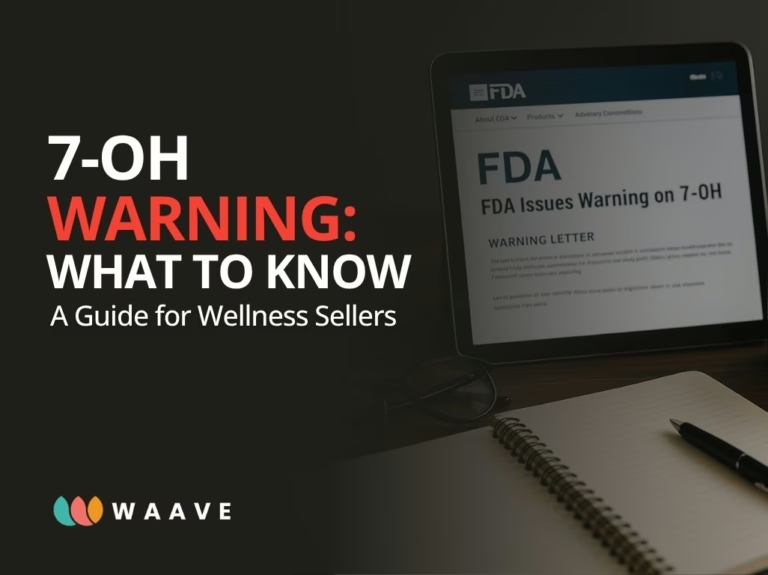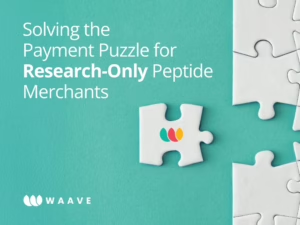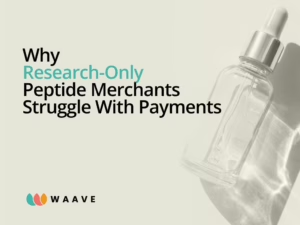FDA Issues Compliance Warning on 7-Hydroxymitragynine (7-OH)
On July 23, 2025, the U.S. Food and Drug Administration (FDA) issued formal warning letters to companies marketing products containing 7-hydroxymitragynine (7-OH) and other lab-synthesized kratom alkaloids. This action does not constitute a product ban, but it does raise serious red flags for the wellness industry.
If you’re selling kratom or related products, this moment matters.
What’s the FDA Concerned About?
Here’s a closer look at the agency’s position:
1. Marketing claims are the primary issue
The FDA’s focus is not only on the compounds themselves but on how products are described. Terms implying treatment, cure, or prevention of medical conditions—whether direct or implied—can prompt enforcement.
2. Synthetic and isolated alkaloids are under tighter scrutiny
While 7-OH is present in kratom in natural trace amounts, it is treated differently when isolated or lab-produced, especially at higher concentrations. Regulators are increasingly cautious about products with enhanced or modified alkaloid content.
3. This is not a ban—but a serious compliance signal
The FDA has not pulled these products from shelves, but its tone makes clear that wellness sellers must realign with federal marketing and labeling standards—or face future enforcement.
4. DEA involvement is on the table
The FDA has formally recommended that the DEA schedule 7-hydroxymitragynine (7-OH) as a Schedule I substance. If that request is approved, the sale and possession of 7-OH would become federally illegal—requiring immediate removal from your product lineup.
Even if the DEA doesn’t move forward with scheduling, it may issue an opinion letter or public notice, which—while not carrying the same legal weight—can still serve as grounds for federal enforcement. Either outcome reinforces the need for sellers to stay alert and have a compliance strategy in place.
WAAVE’s Position: This Action Shouldn’t Be Dismissed
At WAAVE, we believe this matter is part of a broader shift in how wellness products—particularly those with psychoactive potential—are being regulated.
This is not an isolated incident. It follows a growing pattern across multiple verticals where the combination of novel formulations and therapeutic language places even lawful products at risk. A formula may be technically legal, but it can become a regulatory target if it’s marketed in the wrong context.
We align with the American Kratom Association’s position:
The FDA’s approach creates confusion and uncertainty for both consumers and responsible vendors.
We also believe the wellness industry deserves regulatory clarity, not enforcement through ambiguous standards. This latest action does not appear to provide that clarity. Instead, it sets a tone that could influence how kratom and its components are treated in future federal policy.
What Should Sellers Do Now?
To avoid enforcement risk and protect your brand:
- Review all product labels, websites, and marketing materials—not just for 7-OH but any product that could be viewed as having a psychoactive effect.
- Avoid any medical or therapeutic claims, even those embedded in customer reviews or educational content.
- Monitor evolving regulatory sentiment—and align with compliance-forward strategies that preserve your ability to sell legally.
The Bigger Picture
This FDA letter is more than a notice—it reflects the growing complexity of selling high-risk wellness products. If you’re working with kratom, cannabinoids, or novel botanicals, your business model must be built around compliance-first principles.
WAAVE will continue to monitor and interpret developments like this to help our merchants stay in business—and stay within the law.
Because the real risk isn’t one letter—it’s not seeing where the road is heading.
If you are concerned about the compliance status of your website, book a meeting with us.






